On Their Own Terms
Air Date: Week of May 15, 2009
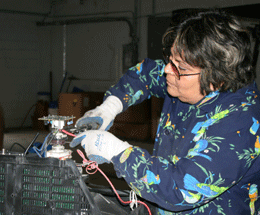
Turning a tossed TV into a job opportunity. (Photo: Ingrid Lobet)
A steady stream of discarded televisions and computers flows into America's landfills. Some of the electronics also end up in shops in Asia that have hazardous working conditions. But now some are heading to a worker-run women's cooperative in Mexico, a business the women started from scratch. Living on Earth’s Ingrid Lobet reports from Fronteras, Mexico.
Transcript
YOUNG: It’s Living on Earth. I’m Jeff Young.
CURWOOD: And I’m Steve Curwood.
As you’ve no doubt heard, if you have an old TV and it’s not hooked up to cable or satellite, you’ll soon have no signal. American television is going digital. And you only have till June to buy a new TV – or a converter box.
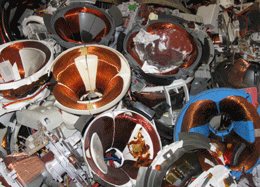
The yokes that wrap the back of old TV picture tubes are a rich source of copper.(Photo: Ingrid Lobet)
[SOUND OF TRACTOR BACKING UP]
LOBET: An eighteen-wheeler backs into the loading bay of a concrete building, 45 minutes south of the Arizona border.
[SOUND OF TRUCK STOPPING]
LOBET: The driver jumps down, hammer in hand, to break the plastic lock Mexican customs put on the truck a few miles back.
[SOUND OF LOCK BREAKING]
LOBET: The lock showed no contraband brought in from the United States.
[SOUND OF METAL HITTING CONCRETE AND MOTOR STARTING UP]
LOBET: Inside the back of the trailer, old TVs and computers are stacked floor to ceiling. Even though the electronics are at the end of their life, Mexican customs wants to know where each unit was manufactured.
[SPANISH WITH ENGLISH TRANSLATION]
HUCHIM: We brought in 37 pallets of monitors: Seventy-one monitors from China, 160 from Japan, Philippines, five from Hong Kong, and one from Finland. Net weight 11 tons.
LOBET: That's Mariano Huchim with Retroworks Mexico, a small electronics recycling startup. And from the loading dock those eleven tons of TVs and computers swiftly make their way here to this workbench…
[SOUND OF TAKING APART ELECTRONICS]
LOBET: …where, on any given day, four to eight women stand, taking them apart.
[SPANISH WITH ENGLISH TRANSLATION]
COTA: We are super happy with this work.
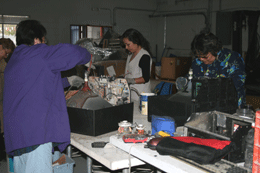
Maria Dolores Cota, Lidia Barreda, Mirta Rico Armenta, Vicki Ponce, some of the Retroworks chicas bravas at work. The electricity in the building still hasn't been turned on due to resistance from the local mayor. (Photo: Ingrid Lobet)
LOBET: Maria Dolores Cota, or Dona Loli, as her coworkers call her, says she's very grateful to have this job, because she went a long time without one.
COTA: We got the opportunity to work! And we are older--we didn’t have the slightest hope. In Mexico there was NO hope for us to work.
LOBET: Lidia Barreda, takes apart a TV next to her, and chimes in.
BARREDA: It's really true because here in Mexico there's a lot of discrimination against people who are older. After the age of 35, it's hard to get a job. It's not like in the United States where older people keep on working.
LOBET: There have been few jobs here in the town of Fronteras ever since a Levelor blinds factory closed. So about three years ago a group of women, in their 50s, decided to organize. They invited a local rancher who speaks English, Alice Valenzuela, to join them and asked for her help. Soon after, Alice ran into a business owner from Vermont. He runs an electronics recycling company and was looking to expand. She tried to persuade him to do it in Fronteras. Some in town were skeptical.
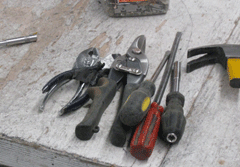
The tools of the chicas' trade: pliers, wire cutters, tin snips, screwdriver and ratchet screwdriver. The women say they could work three times as fast if they had the electricity to power pneumatic tools. (Photo: Ingrid Lobet)
VALENZUELA: Everybody said the women's cooperative would never make it. We we had no money and no contacts so we would never find a building in which to put a business. We would never find an investor who would want to come to a town with dirt streets and no infrastructure.
LOBET: But the Vermont recycler, American Retroworks Inc., did partner with them. And local officials lent them the old Levelor blinds building. Next thing they knew, these older, unemployed women from a small town in northern Mexico were on their way to Vermont to learn the e-waste trade.
VALENZUELA: That meant getting on a plane for the first time in their lives. That meant changing planes at JFK airport when they don’t speak English and had never had that experience before.
LOBET: That trip to Vermont left a lasting impression says Doña Loli.
COTA: The people there, they didn't view us as outsiders. They treated us like equals. There was no age discrimination. There was no racism. It was very different from Mexico.
LOBET: Since then, the economy has taken a dive. But the owner of Retroworks in Vermont has told the women he'll stick with them, and that wins him their undying allegiance.
DOÑA LOLI: He says he really cares about us. He says we're his family. I mean, who are we, really? But for him, we are somebody.
LOBET: Fully trained, the group began organizing roundups of old electronics across southern Arizona, then trucked the goods here to take apart. People in town started calling them las chicas bravas, the tough girls.
[SOUND OF RUSTLING IN BARRELS]
PONCE: This is pure copper….These are mother boards from computer monitors…. These are fans from television sets.. These contain gold.
[SOUNDS OF GOLD CHIPS TINKLING]
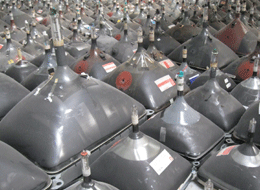
TV picture tubes awaiting proper disposal. (Photo: Ingrid Lobet)
LOBET: Vicki Ponce shows how they sort the motherboards and fans and copper wire into barrels. They sell the parts to buyers in Florida, Malaysia and Egypt.
[SOUNDS OF HAND TOOLS]
LOBET: Yet, a year and a half after they began taking apart electronics here, the women continue to work in this building without electricity. The mayor has asked the electric company to keep the power off. He seems to have something against them.
PONCE: Probably it's because we haven't made any contributions to him. Or it could be that he hates us because we stood up for ourselves.
LOBET: Getting this business off the ground has been one constant struggle. Throughout the office visits to get numerous licenses and permits, the women have refused to pay any bribes. Many people here agree that refusal has slowed their progress. But they won't budge.
PONCE: We want everything clean. …We want to hold our heads up, we don't want people to say we were involved in anything shady. So that investors who come to Sonora know that we're operating honestly.
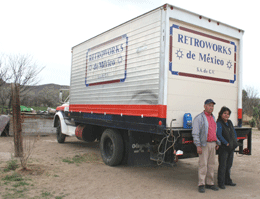
Vicki Ponce and Don Antonio "Chuco" Chavez Othon with the Retroworks truck in their backyard and the Sonoran mountains behind. (Photo: Magdalena Gonzalez)
LOBET: The women say the adversity has made them stronger. Vicki Ponce remembers her fourth visit to one government office.
PONCE: We had been there for two or three hours. They kept saying, he hasn't arrived, and he hasn't arrived.
LOBET: Finally someone came out and said "come back tomorrow"
PONCE: And we said we're not coming back, because we're not leaving here until you give us that paper. Look at my hands, do you see long painted fingernails? These are the hands of a working woman, and we need that paper in order to keep working. You are the government and you have to deal with us because you live off our salary.
LOBET: Vicki and the other women say some of that internal fortitude they've developed, comes from working closely with Alice Valenzuela, the rancher who's struggled with them every step of the way.
PONCE: Alice, She has another culture. You know Mexican women, we are often raised to put up with hard times and just adapt to our husbands. But she speaks her mind. And she tells us we have worth, no matter who we're talking to. We have rights as citizens. And our politicians should serve us, not serve themselves.
LOBET: The women joke that their bond with Alice is so strong, their fates are cast together.
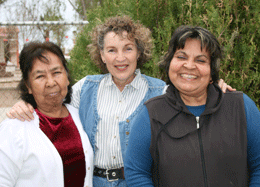
Doña Alicia Menta Gomez, Alice Valenzuela and Vicki Ponce. (Photo: Magdalena Gonzalez)
PONCE: We're like a married couple. We can't be broken up. We have fights, but we stay together, we can't get divorced. Sometimes we say 'what a mean husband we got!' [laughs]
[SOUND OF WAREHOUSE DOORS ROLLING UP.]
LOBET: The perseverance through all the paperwork and the resistance from the mayor, is paying off. The little startup is expanding. Recently they had to rent a bigger warehouse in Douglas, Arizona.
HUCHIM: This company could go very far, very, very far.
LOBET: Mariano Huchim runs Retroworks' warehouse and has a computer science degree. When computers and TVs arrive here from curbside pickups, nothing makes him happier than to cherry pick the good ones and put them back into use.
HUCHIM: Just because the people in the United States don't want something, doesn’t mean we're going to destroy it. No. We check to see if it's still good for someone else to use. Then we update it and test it to make sure it works perfectly.
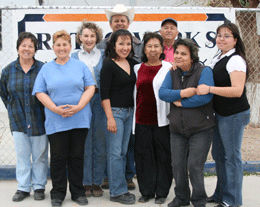
The Retroworks team in Mexico; two more employees work on the U.S. side of the border. (Photo: Magdalena Gonzalez)
LOBET: Mariano says Mexican customers are crossing the border into Arizona to buy these refurbished computers.
HUCHIM: People are really buying them. We've sold maybe 200 computers and nobody's brought us one back yet.
[SOUND OF WAREHOUSE DOORS CLOSING]
LOBET: Although Retroworks Mexico is growing, there is one thing that's keeping it from the big time -- from contracts with companies that have thousands of old computers
[SOUND OF DRIVING]
LOBET: And that's what has Alice and Vicki on the road today.
VALENZUELA: They would love to help us create jobs and they would love to give us their electronics
LOBET: But the glass in computer monitors contains lead. And lead tainted glass cannot be disposed of in a regular landfill. It has to go to a special EPA-approved landfill or a metals plant. Companies don't want to be seen as trying to get around that.

Vicki Ponce at work. (Photo: Ingrid Lobet)
VALENZUELA: They don't want to be accused of sending their waste to a developing country and Mexico does not want to be perceived as the trash dump for the United States.
LOBET: But it turns out there is a giant, EPA-approved copper smelter just 20 miles down the road from Retroworks Mexico. So today, in a meeting they've been trying to arrange for months, Vicki and Alice are hoping to persuade the smelter to take the glass that's been building up in their warehouse, along with a lot more in the future.
VALENZUELA: It would be transformational because we anticipate being able to get not only large contracts from corporations for their electronics, we anticipate that other recyclers will pay us to take their glass because they know where it is going to end up.
LOBET: The meeting with the copper company goes well. Better than expected. Maybe this will be their breakthrough.
Vicki Ponce says a breakthrough will come, sooner or later. She believes in recycling, believes that industry will increasingly mine the industrial ore for its raw materials. And she says she doesn't regret for one minute getting together with this group of women 3 years ago to see if they could create employment in their town.
PONCE: The economy is for entrepreneurial people, people willing to take risks, people who want to move forward. Otherwise we 'd be sitting around with out arms crossed, earning nothing.
LOBET: For Living On Earth, I'm Ingrid Lobet in Fronteras, Mexico.
[MUSIC: Fronteras Recycling: Estampas De Me xico “La Jarabe Jalisciense” from Traditional Music Of Mexico (ARCMusic 2008)]
Links
Living on Earth wants to hear from you!
Living on Earth
62 Calef Highway, Suite 212
Lee, NH 03861
Telephone: 617-287-4121
E-mail: comments@loe.org
Newsletter [Click here]
Donate to Living on Earth!
Living on Earth is an independent media program and relies entirely on contributions from listeners and institutions supporting public service. Please donate now to preserve an independent environmental voice.
NewsletterLiving on Earth offers a weekly delivery of the show's rundown to your mailbox. Sign up for our newsletter today!
 Sailors For The Sea: Be the change you want to sea.
Sailors For The Sea: Be the change you want to sea.
 The Grantham Foundation for the Protection of the Environment: Committed to protecting and improving the health of the global environment.
The Grantham Foundation for the Protection of the Environment: Committed to protecting and improving the health of the global environment.
 Contribute to Living on Earth and receive, as our gift to you, an archival print of one of Mark Seth Lender's extraordinary wildlife photographs. Follow the link to see Mark's current collection of photographs.
Contribute to Living on Earth and receive, as our gift to you, an archival print of one of Mark Seth Lender's extraordinary wildlife photographs. Follow the link to see Mark's current collection of photographs.
 Buy a signed copy of Mark Seth Lender's book Smeagull the Seagull & support Living on Earth
Buy a signed copy of Mark Seth Lender's book Smeagull the Seagull & support Living on Earth

